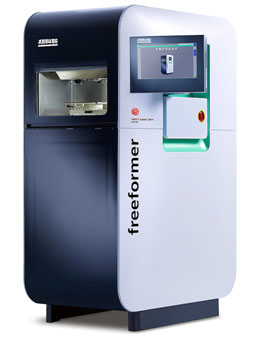| MAIN |
UK & Ireland launch of Freeformer: Additive manufacturing of functional parts| Subj: Press-releses  Arburg Ltd. launched the Freeformer to the UK & Ireland markets at the Williams F1 Centre. Over 100 guests attended the event in Grove, Oxfordshire on 15 September 2015. Drawing on its expertise in machine engineering and plastics processing, Arburg has developed a new industrial additive manufacturing system based on processing qualified standard granulates; the Freeformer machine and the Arburg Plastic Freeforming (APF) process. Arburg Ltd. launched the Freeformer to the UK & Ireland markets at the Williams F1 Centre. Over 100 guests attended the event in Grove, Oxfordshire on 15 September 2015. Drawing on its expertise in machine engineering and plastics processing, Arburg has developed a new industrial additive manufacturing system based on processing qualified standard granulates; the Freeformer machine and the Arburg Plastic Freeforming (APF) process. The Freeformer is the first additive manufacturing machine developed by a plastic injection moulding technology company, and answers the market trend for short product life cycles and the growing demand for both the production of high-quality parts as one-off items and the personalisation of mass produced plastics parts. Huge technological step “The introduction of the Freeformer is a huge technological step for our company,” said Colin Tirel, managing director of Arburg Ltd. in Warwick. “We have always considered ourselves a technology innovator not a technology adopter and our new system for additive manufacturing is a superb example of this philosophy. It will enable us to offer our customers cutting edge technology which we can strategically align with our injection moulding and robot application technology portfolio to meet our customer's short and long term requirements”. Potential for the future The Freeformer is one part of Arburg’s latest connected solutions for “Industry 4.0”. These digital technologies connect machines and products in an internet of the things in the Smart Factory, and will permit greater levels of mass customization of parts in the future. Professor Ian Ashcroft, a research director in additive manufacturing (AM) at the Centre for Innovative Manufacturing in AM at the University of Nottingham, gave a presentation about future trends in AM, the increasing use of multiple materials and topology optimisation at the launch. One Arburg Ltd customer, Bob Cook of Rotary Motion Technologies, commented: “Companies like ours need to respond to this because it is the way technology will go in the future – it is part of a trend for lightweighting, methods to reduce global warming, to produce parts efficiently and reduce development costs. At some point cars will be made completely from plastic components, including the engine, so additive manufacturing will have an important role and will have to scale up.“ New Arburg Plastic Freeforming process The patented Arburg Plastic Freeforming (APF) process has been purposefully developed to be more accessible to plastics processing companies such as moulders, using a qualified standard polymer granulate that is far cheaper than some additive manufacturing materials. While customers have long been able to rely on Arburg’s injection moulding expertise and therefore on the efficient mass production of plastic parts, the same now applies to the cost-effective additive manufacturing of one-off parts and multiple-variant small-volume batches. As with injection moulding, the granulate is first melted in a plasticising cylinder. A stationary discharge unit with a special nozzle then applies the plastic droplets layer-by-layer onto a movable part carrier using high-frequency piezo technology at a specified duty cycle of 60 to 200 Hertz. The droplets fuse together on cooling. The process allows uniform material displacement and creates strong, fully functional parts. The construction chamber of the two component Freeformer offers space for parts with maximum dimensions of 154 x 134 x 230 millimetres. Supports The Freeformer is equipped with a movable three-axis part carrier and two stationary discharge units as standard. The second discharge unit can be used for an additional component in order to e.g. produce a part in different colours, with special tactile qualities, or as a hard-soft combination. Where necessary, the Freeformer can build up structures from a special support material. This makes it possible to achieve unusual or complex part geometries. The supporting structures are subsequently removed in a water bath. As an alternative, support can be built up in the same material as the part itself. A thinned out intermediate layer with specifically generated predetermined breaking points enables the supporting structure to simply be broken off mechanically at a later stage. This option is preferred for parts with free-standing structures and clearly defined edges. Automatic data processing The 3D CAD data for the parts being manufactured (STL files) are processed offline on a PC. A special software generates the necessary manufacturing data via slicing. Once the Freeformer control system has received this data, which determines, e.g. the axis movements, production can begin. Operation is extremely simple, no special programming or processing knowledge is required. Environmentally and user friendly One great advantage of working with the Freeformer is that no dust or emissions are produced and no additional infrastructure is therefore necessary. No extraction units or cooling water are required. The system is therefore also perfectly suitable for use in an office and laboratory environment. Source: Arburg Previous news |
© 2002—2025 PLASTINFO